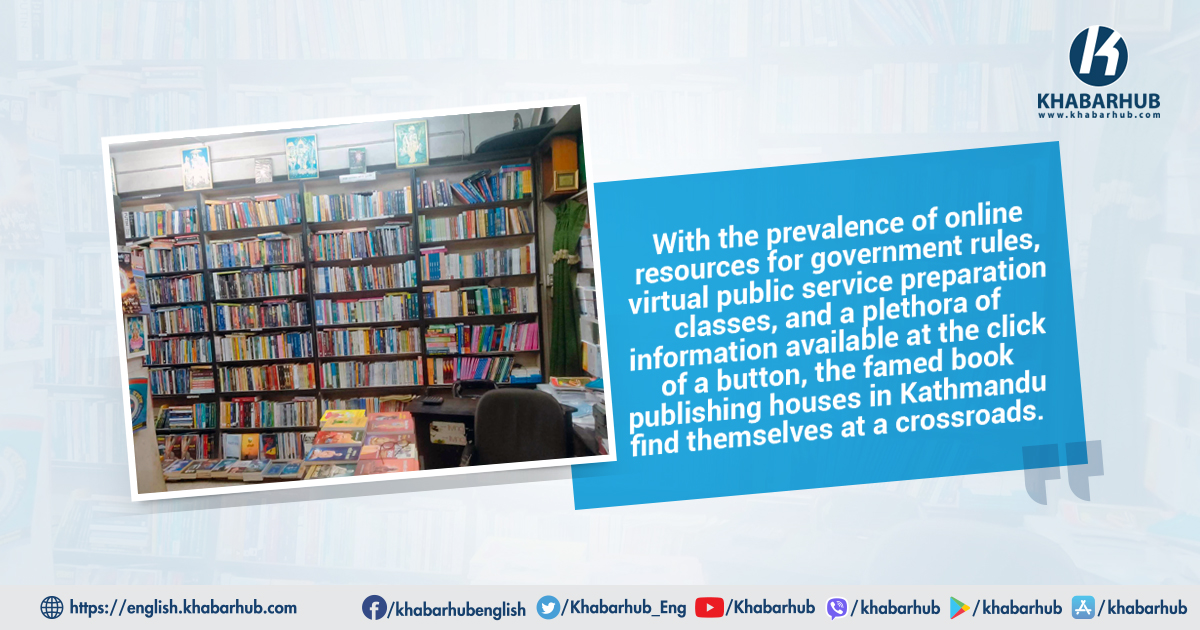0%

KATHMANDU: In the evolving landscape of education and career choices, 18-year-old Bikram Bista’s journey from Bajura to Kathmandu reflects a broader societal shift.
Once driven by aspirations of government service, he now envisions employment in Korea, driven by the pursuit of a bachelor’s degree and the lure of opportunities abroad.
However, this shift has unintended consequences for traditional bookstores, especially those in the heart of Kathmandu.
A decade ago, the dream post-class 12 was often centered around entering government service, fostering a culture of avid readers preparing for public service exams.
Fast forward to today, and the paradigm has shifted.
With the prevalence of online resources for government rules, virtual public service preparation classes, and a plethora of information available at the click of a button, the famed book publishing houses in Kathmandu find themselves at a crossroads.
The impact of the digital era extends beyond government service aspirations.
The allure of idiosyncratic Facebook topics has replaced the inclination to delve into profound thoughts, leaving books neglected.
As the education system adapts to an online-focused model, traditional bookshops are grappling with a loss of customers.
Readers, enamored by the convenience of online information, express a declining interest in physical books.
Kailash Bam, preparing for his journey to Australia, notes, “The times have changed. Exam materials and guides are redundant when examination papers are publicly available transparently.”
The book market is feeling the ripples of change brought about by IT, with even small businesses adopting digital practices.
Publishing houses attribute the decline in their business to the exodus of young individuals and students pursuing opportunities abroad.
They highlight challenges such as high rent, impractical tax policies, and a general economic downturn, leaving them with no choice but to contemplate closing their shutters.
Booksellers in Kathmandu’s Putalisadak, specializing in school and college books, Public Service Commission syllabi, guides, guess papers, and law books, report a significant drop in sales attributed to the internet’s influence.
Anup Paudel, a seasoned book business owner, laments this unprecedented downturn, observing a shift in customer preferences towards Korean and Japanese language books.
Additionally, the once-popular religious books, like the Bhagawat Gita, have lost traction as people increasingly rely on the internet for their reading needs.
The digital age has not only changed career aspirations but has also altered reading habits, challenging traditional bookstores to adapt or face the inevitable consequences of technological progress.
Muskan Raut, proprietor of a stationery business in Putalisadak, laments the adverse effects of the economic recession on the once-vibrant area.
Operating his shop for six years, Raut observes a stark contrast between the past and present – increased rents accompanied by a dwindling book business.
Expressing concern for the future, Raut predicts the possible merging of book businesses within the next few years.
The imposition of unnatural taxes on paper has led some to speculate that the book publishing industry is further hampered by the reliance on Indian printing.
Despite catering to college and public service needs, Raut’s books fail to capture interest.
Fellow bookshop owners echo the sentiment, pointing out that professionals like teachers, professors, lawyers, journalists, and even critics seem disinterested in reading.
The allure of idiosyncratic Facebook topics has replaced the inclination to delve into profound thoughts, leaving books neglected.
Maniram Belbase, a book vendor near Maitighar Mandala, shares his decade-long experience, highlighting the surge in popularity of engineering books while other genres suffer.
The aftermath of the pandemic compounded the challenges, with a considerable exodus of Nepali manpower seeking opportunities abroad due to a lack of space for skill investment.
Belbase envisions a balanced resurgence in the book business if adequate education opportunities are provided within Nepal.
Tilochan Sapkota, a Public Service Commission book writer, acknowledges the impact of the evolving writing style on the business.
Despite resistance to change, Sapkota anticipates improvements that align with the interests of the new generation.
Reflecting on the past, he notes a shift in clientele, with a significant portion seeking language books, a trend attributed to the allure of foreign countries.
In the case of Ratna Book Store, a renowned publishing house in Nepal with an eight-decade legacy, foot traffic has noticeably thinned.
The Maitighar-based Ratna Bookstore, known for its collection of religious books, now appears desolate.
The imposition of unnatural taxes on paper has led some to speculate that the book publishing industry is further hampered by the reliance on Indian printing.
Regardless, the declining interest in books, once revered as fountains of wisdom and awareness, signals a concerning trend amid the rising influence of the internet.